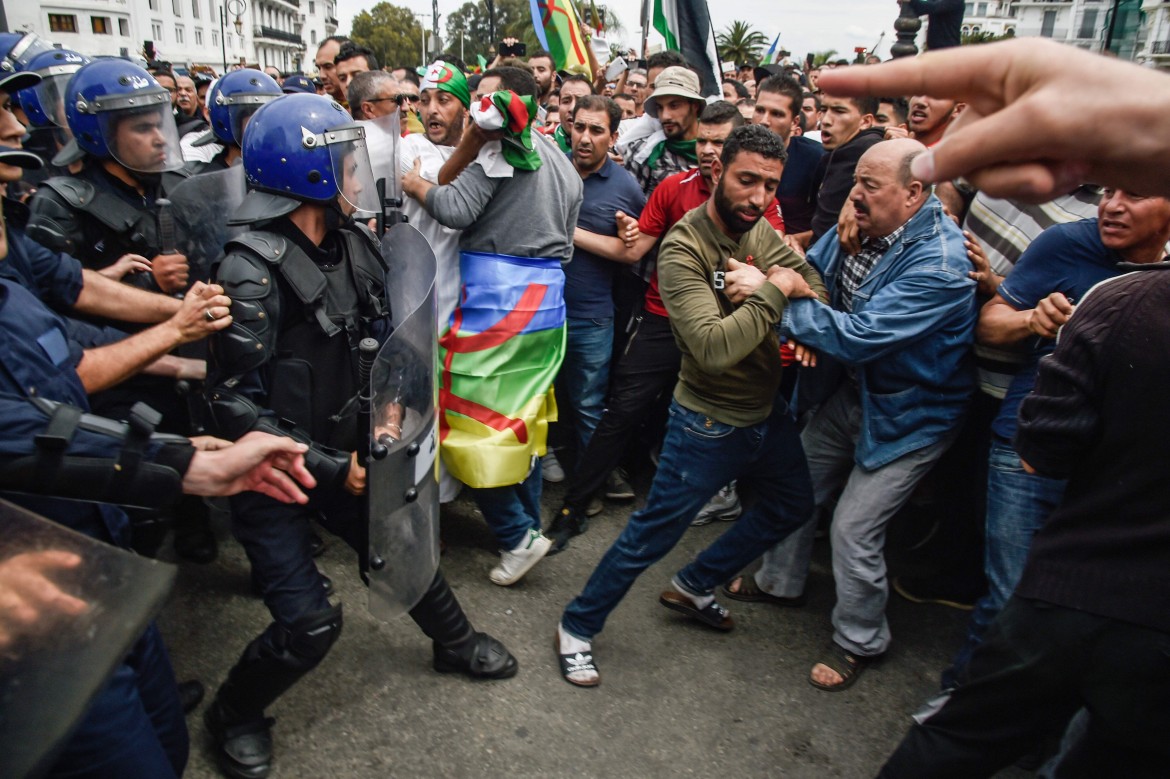Report
After Fekhar dies on hunger strike, the Berbers mobilize
The Algerian activist had been on a hunger strike since March 31. On Tuesday, he died in a hospital after his condition had deteriorated. The sorrow and indignation for his only-too-predictable death gave rise to remembrance and protest activities around the world.

“Pouvoir assassin!” (“Those in power are assassins!”)—this slogan, which was heard everywhere during the “Black Spring” of 2001, is resounding threateningly on the streets again, in Kabylia and in other Berber-speaking regions of Algeria. The Berbers are in turmoil after the death of Kameleddine Fekhar, a human rights activist who had been imprisoned arbitrarily and who was on hunger strike since March 31.
His death on Tuesday, May 28, in the hospital in Blida, where he had been transferred after his condition had seriously deteriorated, is fueling the suspicions that nothing was actually done to save his life and that his fate was decided from above—whether in order to silence a voice that had always denounced the regime’s injustices, or to create an occasion for protests which would provide the pretext for a harsh crackdown, also fomenting division at the forefront of the protests between those of Arab and those of Berber ethnicity. One of the others imprisoned together with Fekhar, Brahim Hadj Aouf, despite having stopped his own hunger strike, is currently suffering mistreatment and abuse and is fearing that he will soon end up like Fekhar.
Kameleddine Fekhar was born on Feb. 9, 1963, in Ghardaia, in the Berber-speaking region of M’Zab in southern Algeria. A physician by profession, he is survived by his wife and his eight children. A tireless champion of human rights in a country where the ruling classes don’t have the slightest concerns about the rights of the weak and of minorities, he had already been arrested on several occasions for his activities, as well as suspended from practicing his profession for eleven years.
The region of M’Zab is the last refuge of the few remaining Ibadi Muslims in Algeria, after the Fatimids took power around year 1000. Followers of a branch of Islam distinct from both the Sunni and Shia traditions, they took refuge in this large valley at the edge of the desert, building five cities with a unique style of urban planning, which drew the admiration of Le Corbusier and which has long attracted a large part of the flow of tourism to Algeria.
They are known for their hardworking and peaceful nature, since their beliefs involve a strict work ethic, to the point that they have been described as the “Islamic Calvinists.” But they have always been frowned upon by the regime in Algiers, on account of their attachment to their culture and ancestral traditions, which include the Berber language. The regime has been trying to make them disappear in any way possible, by confiscating their lands and organizing mass campaigns of housing dispossessed Arabs in their region, who often come into conflict with the commercial activities of the locals, leading to violence against persons and property.
In 2015, the situation deteriorated to such an extent that several deaths were recorded, as well as damage to ancient mausoleums recognized as World Heritage sites. Videos recorded at the scenes show that the authorities were guilty of abandoning their responsibilities, with the police protecting and accompanying the violent mobs instead of stopping and disarming them.
Kameleddine Fekhar came to Italy to denounce this racist and criminal behavior, and later made an appeal to the United Nations in which he asked for the help of the international community to stop the “apartheid and ethnic cleansing” taking place against his people. This act earned him a sentence of two years in prison, and he was only released after the international outcry that was raised around his case.
For his latest arrest, however, it was enough for him to claim in an interview that the administration was practicing segregation against the local population, and he was thrown into prison without even the barest pretense of due process. In full confirmation of the repressive program being implemented by the authorities in Ghardaia, his lawyer, Salah Dabouz, has also been charged for the mere fact that he was working for Fekhar’s defense and bringing daily updates to the outside world about the inhuman treatment that he was receiving in prison.
In recent days, the reports had become more and more dramatic, describing Fekhar in a state of collapsing health, and the continued refusal by the authorities to release him or to provide adequate medical care.
The sorrow and indignation for his only-too-predictable death are giving rise to remembrance and protest activities everywhere, both in Algeria itself and among the Algerian diaspora. It was proposed that a minute of silence was observed Friday by the protesters during the demonstrations against the regime, which have continued without pause since the end of February.
A committed pacifist, Fekhar was working to maintain the unity of purpose between the Berbers and the Chaamba Arabs of the region, in order to fight the regime’s injustice together. We hope that his death, instead of increasing tensions between the two communities, will end up strengthening the protests against the “assassins in power” who have added another victim to the many they already have on their conscience.
On Saturday, a demonstration took place in Milan, outside the Algerian consulate. Among the demands of the protesters was an appeal to Italian politicians to send a message of protest to the government in Algiers and demand that the truth be brought to light regarding those responsible for the death of Kameleddine Fekhar. “If Algeria is a country in which every citizen can be thrown in prison arbitrarily and only come out dead, it should be impossible to refuse refugee status to any Algerian who requests it in Italy,” the appeal argued.
Originally published at https://ilmanifesto.it/fekhar-muore-in-cella-i-berberi-si-mobilitano/ on 2019-05-31
